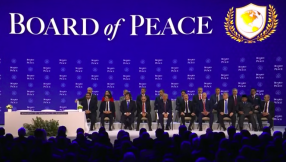
Last year, Alpha experienced its most successful year since it began nearly five decades ago. More than two million people took part in the course worldwide in 2024 – more than in any previous year – confirming Alpha’s place as one of the most widely used tools for exploring the Christian faith.
The scale of the growth is significant. Over 81,000 courses were run across 146 countries, supported by more than 43,000 churches, organisations and individuals. The course, originally launched in 1977 at Holy Trinity Brompton in London and later adapted by Rev Nicky Gumbel in 1990 for those outside the church, has retained its original simplicity while expanding to every continent.
“Alpha is not a place where we share our faith,” Gumbel has said, “but it's a place where we provide an environment where people can explore faith for themselves.” That ethos has been central to the course’s appeal: no pressure, no assumptions – just space to ask, listen, and reflect.
A notable development last year was the launch of the new Alpha Youth Series in November. In just a matter of months, over 250,000 young people in 53 countries had taken part. In total, more than a third of all Alpha participants in 2024 were under the age of 25.
This shift highlights the growing appeal of Alpha among younger generations, many of whom are looking for spaces to ask deeper questions and engage with faith on their own terms.
Alpha’s impact is often best understood through individual stories. Godfrey, who attended a course after a friend invited him, spoke about the unexpected comfort and clarity it brought him: “In the face of so much adversity in blackness, I found a sense of belonging to family, a sense of belief, a sense of knowing that there is hope beyond the horizon.”
While its reach is now global, Alpha’s growth continues to depend on ordinary people willing to create space for conversation.
In Nigeria, Darius began hosting courses for young people and found that the experience changed his own life as well: “Alpha has enabled me to build a virtual community of young people who love God and desire to deepen their knowledge of Him. Hosting Alpha has been a powerful reminder that God works through simple acts of hospitality and conversation.”
An Alpha spokesperson from their London HQ reflected on the enduring appeal of the course and its deeper spiritual significance: “On Alpha we love to see people make friends, have fun and explore faith in a welcoming environment. Our deepest longing, however, is beyond human engineering. It's to see first-hand the supernatural things of the Kingdom of God: forgiveness, healing, and the prophetic.”
That balance – between warm, sociable outreach and a profound desire for spiritual transformation – remains at the heart of Alpha’s mission.
Alpha’s emphasis on personal invitation rather than professional evangelism has proved enduring. Pastor Joel Kalin put it simply: “Not everyone is an evangelist, but everyone can invite.”
As churches in the UK continue to reflect on how to re-engage their communities, Alpha is increasingly seen as a valuable tool in the “quiet revival” of Christian faith. It offers a safe, sociable framework for outreach – an accessible starting point for those curious about belief and belonging.
Because it is free to run, and because its structure is built around shared meals and open conversation, Alpha provides churches with a way to foster genuine hospitality. In many cases, the relationships formed around the table lead to lasting friendships, and the first steps of a new faith journey.
“Alpha is an effective form of evangelism when run by and through the local church,” Nicky Gumbel has said. That model – deeply rooted in local relationships and the life of the church – remains key to its continued impact both at home and abroad.
What began as a small initiative in a West London church basement has grown into a global movement. Yet Alpha’s core remains unchanged: honest discussion, genuine welcome, and a place for people to explore what they believe.
As last year’s record numbers show, more people than ever are accepting that invitation.













